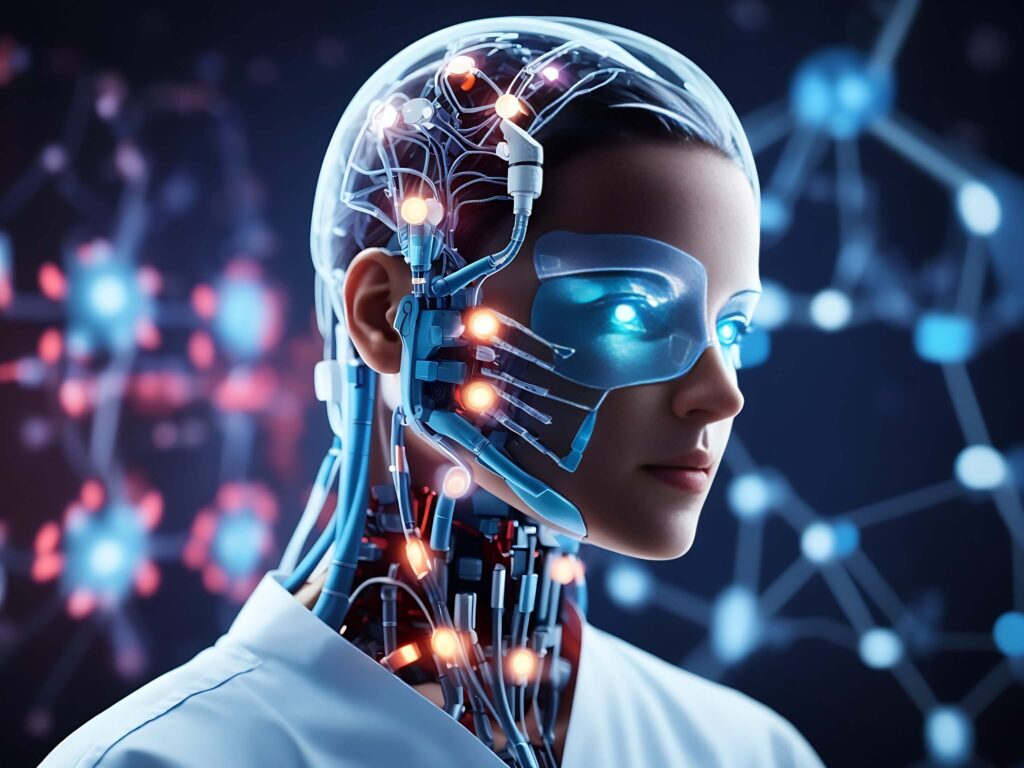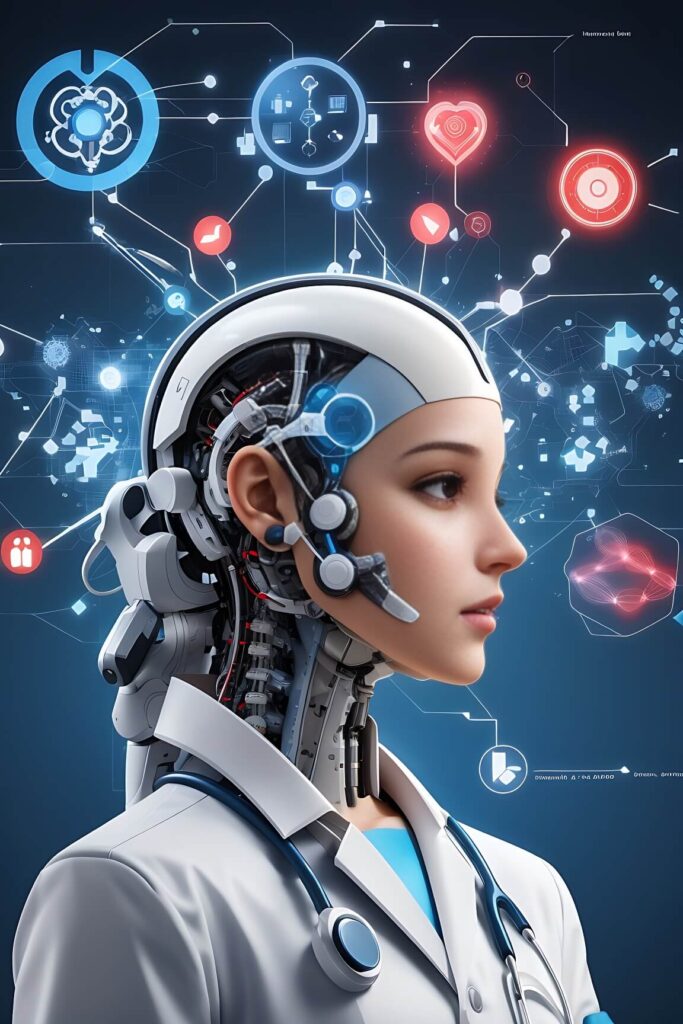In the rapidly evolving landscape of modern healthcare, the emergence of Artificial Intelligence (AI) has sparked a profound transformation, promising to revolutionize the way we approach diagnostics and treatment. AI, a groundbreaking branch of computer science, has emerged as a powerful ally to medical professionals, augmenting their capabilities and ushering in a new era of personalized, efficient, and effective healthcare. In this blog post, we embark on a journey to explore the ascendancy of AI in the realm of healthcare, delving into its profound impact on diagnostics and treatment, and envisioning the boundless possibilities it holds for the future of medicine.
At its core, AI in healthcare represents the culmination of technological prowess and human ingenuity, as it endeavors to emulate human-like intelligence in processing and analyzing vast amounts of medical data. Its ability to recognize patterns, detect anomalies, and learn from diverse datasets positions AI as an indispensable tool in the hands of healthcare providers, empowering them to make well-informed decisions with unprecedented precision and speed.
The advancements in AI-powered diagnostics are nothing short of extraordinary, promising to reshape the way we detect and address medical conditions. By leveraging sophisticated machine learning algorithms, AI systems can sift through medical imaging data with unmatched accuracy, unearthing subtle nuances that might evade even the keenest human eye. This potential for early detection of diseases, such as cancer, cardiovascular disorders, and neurological ailments, has the potential to save countless lives and significantly improve patient outcomes.
Beyond diagnostics, AI is catalyzing a paradigm shift in treatment methodologies, presenting a new horizon of possibilities. Collaborating seamlessly with skilled medical practitioners, AI-driven robotic systems are elevating surgical precision to unparalleled heights. The incorporation of robotics in surgical procedures translates to minimized human error, reduced recovery time, and enhanced accessibility to expert medical care across geographical barriers.
Furthermore, AI’s influence extends to the domain of drug discovery, where its data-crunching capabilities expedite the identification of potential therapeutics. The acceleration of drug development through AI holds the promise of addressing previously intractable medical challenges and ushering in novel treatment options for a wide array of ailments.
As we venture into this realm of AI-driven healthcare, it is essential to contemplate the limitless prospects that lie ahead. Predictive analytics, empowered by AI, could steer us towards preventive care, proactively mitigating health risks and fostering a culture of wellness. Virtual health assistants, driven by AI’s conversational abilities, have the potential to amplify patient engagement, bolster medication adherence, and bolster overall healthcare management.
However, with such transformative power comes the responsibility to address ethical considerations, data privacy concerns, and potential biases that AI may inadvertently inherit from historical data. Striking a harmonious balance between AI and human collaboration is paramount to harnessing the full potential of this technology and ensuring equitable access to quality healthcare for all.
In the pages that follow, we will traverse the landscape of AI in healthcare, exploring its benefits, confronting its challenges, and envisioning a future where human potential synergizes seamlessly with AI’s cognitive prowess to create a healthier and brighter world. Let us embark on this expedition to unlock the possibilities of “The Rise of AI in Healthcare: Transforming Diagnostics and Treatment.”
What is Artificial Intelligence (AI) in Healthcare?
AI, a field of computer science, aims to develop intelligent machines that can perform tasks requiring human-like intelligence. In the context of healthcare, AI systems can analyze complex medical data, recognize patterns, and make informed decisions, providing valuable support to medical professionals.
AI in Diagnostics: Enhancing Precision and Speed
Enhancing diagnostics is one of AI’s most important contributions to the medical field. Traditional diagnostic methods often rely on manual interpretation, which can be time-consuming and prone to human error. With AI, we can now leverage machine learning algorithms to analyze vast amounts of medical data quickly and accurately.
A. Detecting Diseases with Unprecedented Accuracy
AI-powered diagnostic tools can analyze medical imaging data, such as X-rays, MRIs, and CT scans, with remarkable precision. These systems can identify minute abnormalities that might go unnoticed by human eyes, leading to earlier detection and intervention for various conditions, including cancer, cardiovascular diseases, and neurological disorders.
B. Personalized Treatment Plans
To develop individualized treatment regimens, AI may process a patient’s medical background, genetic information, and lifestyle data. AI can recommend the best treatments and medications by comprehending the particular needs of each patient, improving the effectiveness of care.
AI in Treatment: Revolutionizing Patient Care
Apart from diagnostics, AI is making significant strides in transforming the treatment landscape.
A. Robot-Assisted Surgeries
AI-powered robotic systems are changing the face of surgery. These precise machines can perform complex procedures with unparalleled accuracy, minimizing the risk of human error and reducing recovery time for patients. Surgeons can now conduct intricate surgeries remotely, bringing expert medical care to even the most remote locations.
B. AI-Enabled Drug Discovery
The traditional drug discovery process is time-consuming and expensive. AI is revolutionizing this area by rapidly analyzing vast databases to identify potential drug candidates. This speedier drug development process holds promise for addressing various diseases and improving global healthcare.
The Future of AI in Healthcare: Limitless Possibilities
The potential of AI in healthcare goes beyond diagnostics and treatment. As technology continues to evolve, we can expect even more groundbreaking advancements:
A. Predictive Analytics for Preventive Care
AI can predict potential health risks in individuals based on their health data, lifestyle, and genetic makeup. By identifying at-risk individuals, healthcare providers can intervene early, offering preventive measures to improve overall health and reduce the burden of chronic diseases.
B. Virtual Health Assistants
Imagine having a virtual health assistant that can provide medical advice, remind you to take medications, and monitor your health round-the-clock. AI-driven virtual assistants hold the potential to enhance patient engagement, ensure medication adherence, and enable better management of chronic conditions.
Addressing Ethical and Privacy Concerns
While AI presents transformative opportunities, it also raises ethical and privacy concerns. As we integrate AI deeper into healthcare, we must ensure the responsible use of patient data, maintain transparency in AI algorithms, and establish robust security measures to safeguard sensitive medical information.
Embracing the Collaboration of Humans and AI
As AI becomes an integral part of the healthcare ecosystem, it’s essential to recognize that the true potential lies in the collaboration between humans and machines. AI does not replace healthcare professionals; instead, it empowers them with invaluable tools and insights to deliver better care.
A. Augmented Intelligence in Medical Decisions
Healthcare providers can leverage AI-generated insights to make well-informed decisions. By combining their expertise with AI’s analytical capabilities, doctors can develop comprehensive treatment plans that are both evidence-based and tailored to the individual needs of each patient.
B. Empowering Patients with Knowledge
In the age of information, AI can serve as a powerful educational tool for patients. With the assistance of AI-driven platforms, individuals can access reliable medical information, learn about their health conditions, and actively participate in shared decision-making with their healthcare providers.
Addressing AI Bias and Ensuring Equity
As AI algorithms learn from historical data, there is a risk of perpetuating existing biases present in the data. To ensure equitable healthcare, it is crucial to address and minimize biases in AI systems. This involves diverse and representative data collection, continuous monitoring of AI performance, and an ongoing commitment to refining these systems to provide unbiased care to all patients.
Overcoming Barriers to AI Adoption in Healthcare
While the potential of AI in healthcare is immense, there are challenges that need to be addressed to facilitate widespread adoption.
A. Data Security and Privacy
As AI systems rely on sensitive patient data, ensuring robust data security and privacy measures is of paramount importance. Healthcare organizations must implement strict protocols to protect patient information from unauthorized access and cyber threats.
B. Interoperability and Standardization
To fully harness the power of AI, healthcare systems need to be interoperable and follow standardized data formats. Seamless data exchange between different healthcare providers and systems will enable AI to analyze comprehensive patient information and improve the quality of care.
Frequently Asked Questions (FAQs)
1. Is AI replacing doctors and medical professionals?
No, AI is not replacing doctors or medical professionals. Instead, it acts as a supportive tool that aids healthcare providers in making more informed decisions and providing personalized care to patients.
2. Can AI really improve diagnostic accuracy?
Yes, AI has demonstrated the potential to significantly improve diagnostic accuracy. By analyzing vast amounts of medical data with incredible speed and precision, AI can identify patterns and abnormalities that may not be immediately apparent to human observers.
3. How does AI contribute to drug discovery?
AI accelerates the drug discovery process by analyzing vast databases of chemical compounds and their interactions with biological systems. This enables researchers to identify potential drug candidates more efficiently, expediting the development of new treatments.
4. Is there a risk of AI bias in healthcare?
Yes, there is a risk of AI bias in healthcare. AI algorithms learn from historical data, and if that data contains biases, the AI system may perpetuate them. It is essential to address and mitigate biases to ensure fair and equitable healthcare outcomes for all patients.
Conclusion
The rise of AI in healthcare is transforming diagnostics and treatment, propelling the medical industry into a new era of innovation. From enhancing diagnostic accuracy to revolutionizing treatment approaches, AI holds immense potential to improve patient outcomes and overall healthcare efficiency. However, to fully realize the benefits of AI, we must approach its integration with ethical considerations, data privacy safeguards, and a focus on collaboration between humans and machines. With careful implementation, AI has the power to reshape the future of healthcare, making it more accessible, personalized, and effective for individuals worldwide. As we embrace this transformative technology, let us tread with responsibility, compassion, and a dedication to improving the lives of all through the power of AI in healthcare.




